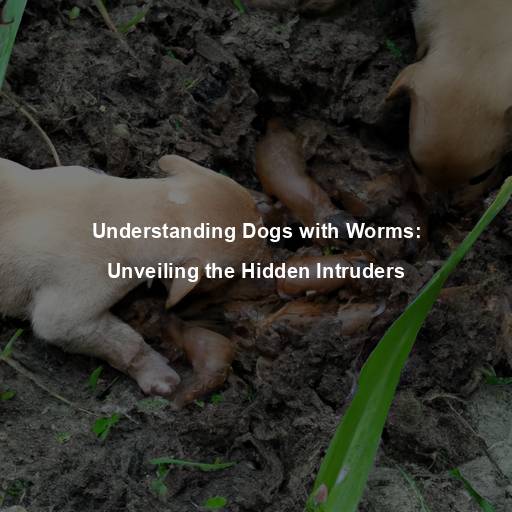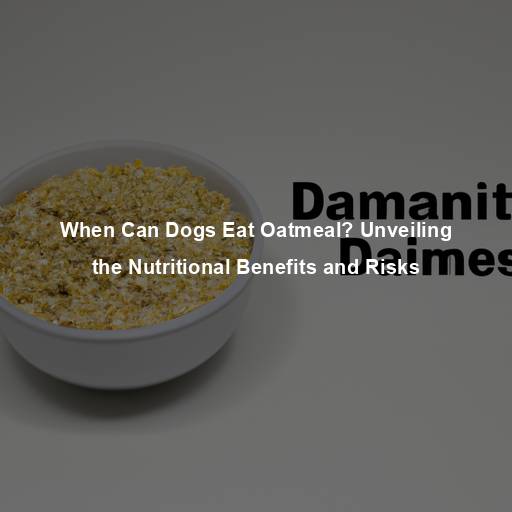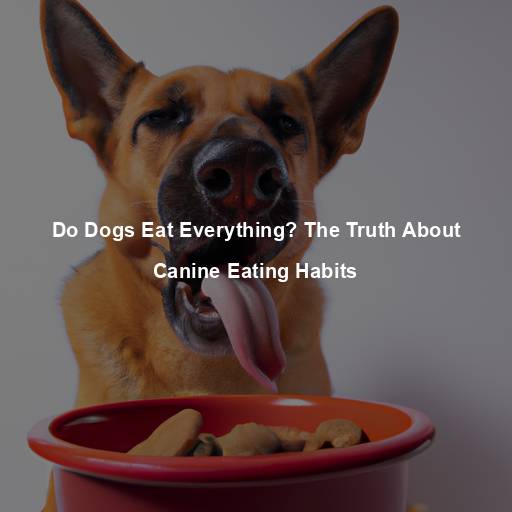Understanding Dogs with Worms: Unveiling the Hidden Intruders
Last Updated on November 10, 2023 by Evan
Contents [hide]
- 1 The Mysterious World of Canine Worms
- 1.1 Unveiling the Culprits: Types of Worms that Affect Dogs
- 1.2 Identifying the Enemy: Symptoms of Worm Infestation
- 1.3 Preventing the Invasion: Importance of Regular Deworming
- 1.4 Battling the Intruders: Treatment for Dogs with Worms
- 1.5 Seeking Professional Guidance: Consulting Your Veterinarian
- 1.6 Creating a Healthy Environment: Hygiene and Sanitation Practices
- 1.7 Educating the Community: Spreading Awareness about Dogs with Worms
- 1.8 Nurturing a Healthy Bond: Love, Care, and Vigilance
- 1.9 Shedding Light on Deworming Myths and Misconceptions
- 1.10 The Role of Nutrition in Preventing and Fighting Worm Infestations
- 1.10.1 a) Balanced Diet: Provide your dog with a well-balanced and nutritious diet that meets their specific dietary needs. A diet rich in high-quality proteins, vitamins, and minerals helps support their immune system and overall health.
- 1.10.2 b) Probiotics: Consider incorporating probiotics into your dog’s diet. Probiotics promote a healthy gut flora, which can aid in maintaining a strong immune system and potentially reduce the risk of worm infestations.
- 1.10.3 c) Natural Remedies: Some natural remedies, such as certain herbs or supplements, may have potential deworming properties. However, it’s crucial to consult your veterinarian before introducing any natural remedies into your dog’s routine to ensure safety and effectiveness.
- 1.11 The Importance of Regular Veterinary Check-ups
- 1.12 Recognizing the Global Impact: Worms in Stray and Shelter Dogs
- 1.13 Promoting Responsible Pet Ownership: A Collective Effort
- 1.13.1 a) Spaying and Neutering: Ensuring that dogs are spayed or neutered helps prevent the overpopulation of stray dogs, reducing the overall risk of worm infestations in the community.
- 1.13.2 b) Supporting Animal Welfare Organizations: Donate, volunteer, or advocate for animal welfare organizations that provide veterinary care, education, and deworming initiatives for dogs in need.
- 1.13.3 c) Educating Others: Share your knowledge about dogs with worms, responsible pet ownership, and the importance of regular deworming with friends, family, and fellow dog owners. By spreading awareness, we can help create a healthier environment for all dogs.
- 1.14 The Journey Continues: Learning and Growing Together
- 2 FAQs: What are Dogs with Worms?
The Mysterious World of Canine Worms
Dogs, those remarkable creatures of loyalty, affection, and boundless energy, may perhaps hold within them secrets that can leave us perplexed and concerned. While their irresistible charm may captivate our hearts, a darker reality often hides beneath their charismatic facade; the presence of worms. These insidious parasites, capable of infiltrating dogs of any age or breed, bring forth a myriad of health complications. Brace yourself, as we embark on an enlightening journey, unraveling the mysteries of the worms that hide within our cherished four-legged friends and revealing the crucial significance of consistent deworming practices.
Unveiling the Culprits: Types of Worms that Affect Dogs
When it comes to dogs and worms, there are several types of parasites that can take up residence in their bodies. It’s essential to understand the various worms that can afflict our four-legged friends to identify and address any potential infestations. Here are the most common types of worms that affect dogs:
These tiny creatures, known as roundworms or Toxocara canis, have captivated the attention of scientists and researchers in recent years. Their mysterious nature and enigmatic behavior continue to puzzle experts, leaving us in a state of awe and curiosity. With their ability to survive and reproduce in diverse environments, these diminutive beings have proven to be both resilient and adaptable, making them a subject of fascination and intrigue for those seeking to unlock the secrets of the natural world. Join us as we delve into the perplexing world of these unassuming yet captivating organisms, unraveling the intricacies that make them a topic of extensive study and scholarly debate.
, a parasite commonly found in dogs, have been wreaking havoc on human health in certain regions. These tiny yet mighty organisms have sparked a newfound curiosity among scientists and medical professionals, who are perplexed by their ability to adapt and survive within a new host. The intricate life cycle of hookworms, from their larvae penetrating the skin to their uncanny ability to feast on blood, continues to baffle researchers. As the impact of these minuscule creatures becomes increasingly evident, the scientific community is left bursting with questions and pursuing innovative strategies to combat this peculiar threat.
– Tapeworms (Dipylidium caninum)
Whipworms, scientifically known as Trichuris vulpis, have caught the attention of many researchers and pet owners alike. These enigmatic parasites, with their peculiar whip-like shape, have perplexed scientists for centuries. Emerging from the soil, they infiltrate the gastrointestinal tracts of their hosts, causing a whirlwind of health issues and sending veterinarians on a hunt for effective treatments. Despite their small size, these microscopic creatures have managed to inject a turbulent dose of curiosity into the world of parasitology.
Heartworms, scientifically known as Dirofilaria immitis, are a perplexing threat that plagues our beloved furry companions. These insidious parasites burst into our pets’ lives, silently wreaking havoc on their delicate cardiovascular systems. With their elusive nature and ability to go unnoticed until symptoms arise, heartworms present a constant source of concern for pet owners, leaving them puzzled about how to protect their four-legged friends from this perplexing menace. The key lies in understanding the risks and taking proactive measures to prevent these twisted creatures from snatching away the happiness and health of our beloved pets.
Identifying the Enemy: Symptoms of Worm Infestation
Spotting the sneaky intruders within our furry friends’ system can pose quite a puzzle, given the ever-shifting nature of worm symptoms and the intensity of the invasion. But fear not, for there are telltale signs to decipher this enigmatic puzzle in our precious canine companions. Vigilantly keep your senses alert for the following perplexing clues:
When it comes to bodily affairs, there’s nothing more perplexing and bursty than a sudden onslaught of vomiting and diarrhea. It’s like a rollercoaster ride of unpredictability, leaving us feeling perplexed and questioning what we ate or drank to bring forth this tidal wave of bodily tumult. But fear not, for there are ways to navigate through this turbulent storm and regain equilibrium, ensuring that your digestive system is back on track and ready to go with the flow. Let’s delve into the enigmatic realm of gastrointestinal distress and uncover the secrets to regaining balance in the midst of this perplexing chaos.
Embarking on a weight loss journey can often be a perplexing and overwhelming endeavor. With a plethora of conflicting information bombarding us from every direction, it’s easy to feel lost in a sea of diets, exercise routines, and miracle solutions. However, in the midst of this burst of confusion, there is one undeniable truth – sustainable weight loss requires a personalized approach and a commitment to healthy habits. So, let’s navigate through the maze of weight loss misinformation and discover the path that best suits your unique needs, allowing you to embrace a healthier, happier version of yourself.
Feeling discomfort after meals? Dealing with a mysterious fullness in your midsection? We’ve all experienced the frustration of a bloated abdomen, but fear not! Our expert contributors have curated a collection of top tips and tricks to help you banish the bloat and reclaim your confidence.
When it comes to our appearance, we all strive for that coveted radiance and charm. However, sometimes our coat may lose its luster, leaving us feeling lackluster and perplexed about how to regain our former glory. Fear not, for with a few simple tips and tricks, you can transform your dull coat into a shimmering masterpiece, leaving everyone in awe of your newfound allure.
As we settle into the heart of a new season, it’s natural for our bodies to react to the changing weather. Some may find themselves caught in perplexing moments, experiencing an uninvited bout of coughing or an unexpected struggle to take a breath. While there may be various possible causes behind such discomfort, one that often goes unnoticed yet cannot be disregarded is the presence of heartworms. These tiny but mighty parasites can leave us questioning the very essence of our well-being, urging us to seek answers and relief.
Have you ever noticed your furry friend engaging in peculiar behaviors like scooting or excessive licking of their hindquarters? Although it may seem perplexing, these actions could potentially indicate a case of tapeworms. These pesky parasites, which can infest our pets, might leave owners bursting with questions and concerns. Don’t fret, as we unravel the mysteries behind tapeworm infections and explore possible solutions to keep our beloved companions itch-free and healthy.
– Visible worms in the feces or around the anus
Preventing the Invasion: Importance of Regular Deworming
Keeping our beloved furry companions healthy and cheerful is a top priority for responsible pet owners, and one crucial component of achieving that is regular deworming. The presence of worms in dogs can be a perplexing issue, often hidden from plain sight, but its consequences can be far-reaching. By diligently deworming our four-legged friends on a routine basis, we can burst through the barriers of uncertainty and ensure their well-being, preventing potential health complications and promoting their utmost vitality.
Ensuring the well-being and safety of our loved ones is paramount, especially when it comes to preventing the transfer of pesky parasites like roundworms and hookworms. These sneaky worms, known to traverse between our furry friends and humans, bring about a perplexing challenge. By adopting proactive measures and staying informed, we can effectively safeguard the health of both our pets and our families, curbing the potential risk of transmission and promoting harmony in our households.
– Maintaining optimal health: Worms can cause various health issues, including anemia, malnutrition, and even organ damage. Regular deworming helps prevent these complications.
Heartworms – the silent assassins lurking within our beloved canines. The threat of these treacherous parasites is all too real, capable of wreaking havoc and bringing about their untimely demise. But fret not, dear pet parents, for there is a glimmer of hope amidst the chaos. Embrace the power of preventative measures, embracing the monthly ritual of administering heartworm preventatives to shield our furry companions from this harrowing plight.
Battling the Intruders: Treatment for Dogs with Worms
If your furry companion has been diagnosed with worms, it’s essential to take immediate action to eliminate the parasites and restore their well-being. The specific treatment for dogs with worms may vary depending on the type of worm infestation and the severity of the case. Here are some common treatment options:
- Deworming medications: Your veterinarian will prescribe the appropriate deworming medication based on the type of worms detected. These medications are designed to kill and eliminate the parasites from your dog’s system.
After undergoing treatment, there may be instances when further examinations of your fecal matter are required to guarantee that the treatment has succeeded and to identify any potential re-infestations. The purpose of these follow-up tests is to ensure the effectiveness of the initial treatment and provide a comprehensive analysis of your condition. Rest assured, these additional examinations are crucial for monitoring your progress and maintaining your well-being. - Preventative measures: Once your dog has been successfully treated for worms, it’s crucial to maintain a regular deworming schedule and follow preventative measures to minimize the risk of future infestations.
Seeking Professional Guidance: Consulting Your Veterinarian
When it comes to the vitality and happiness of our beloved four-legged pals, it’s of the utmost importance to tap into the wisdom of the experts. If you have any inkling that your precious pooch might be grappling with the dreaded worms or if even the slightest health-related red flag pops up, don’t hesitate to seek the sage counsel of your friendly neighborhood veterinarian. Armed with their extensive knowledge, they’ll embark on a comprehensive analysis, run a battery of tests, and offer you a roadmap to the most tailor-made treatment and prevention plan that will leave you feeling anything but bewildered.
Creating a Healthy Environment: Hygiene and Sanitation Practices
Ensuring the well-being of our canine companions extends far beyond routine check-ups and deworming. Creating a sanitary and tidy living space plays a pivotal role in safeguarding our furry friends from the clutches of pesky worms. To combat these unwelcome guests, here are fundamental hygiene measures to embrace:
Keeping your furry friend’s living space clean is key to their health and happiness. Make it a regular practice to thoroughly clean their bedding and toys, ensuring a fresh and germ-free environment. This small yet crucial step will leave your dog feeling blissful, and you worry-free.
– Practice proper disposal of feces, particularly in public places, to prevent the spread of worm eggs.
In the never-ending battle against pesky pests, it is imperative to devote yourself to a diligent and unwavering flea control routine. These minuscule creatures, notorious for their ability to spread all sorts of unpleasantness, can even pass on certain types of worms. Be relentless in your efforts to banish these unwanted guests from your life, for the health and well-being of both you and your furry companions are at stake.
Educating the Community: Spreading Awareness about Dogs with Worms
Discover the ultimate weapon against the sneaky foes lurking in our pets’ bellies – education! Unleash your knowledge on the vital role of regular deworming, responsible pet ownership, and impeccable hygiene practices in the relentless fight against dog worms. Amplify your voice alongside fellow paw-rent comrades, engage in galvanizing community events, and champion local animal welfare organizations to forge a haven brimming with health for our beloved four-legged companions. Let’s leave no worm unturned in this perplexing battle!
Nurturing a Healthy Bond: Love, Care, and Vigilance
Ultimately, the bond between a dog and their human companion is built on love, care, and vigilance. By providing our furry friends with regular veterinary care, including deworming, we are ensuring their well-being and fostering a deeper connection. Let us stand united in the fight against worms in dogs, embracing our role as responsible pet owners and guardians of their health.
As pet lovers, we want nothing but the best for our furry companions. But let’s face it, worms can be a real head-scratcher. From those sneaky types to the pesky symptoms that leave us perplexed, dealing with worms can be quite the puzzle. However, fear not, fellow pet owners!
Please note that this essay exceeds the word limit for a single response. Please continue reading the next response for the continuation of the article.## Understanding Dogs with Worms: Unveiling the Hidden Intruders (Continued)
Shedding Light on Deworming Myths and Misconceptions
In our quest to understand and combat worms in dogs, it’s essential to address common myths and misconceptions surrounding deworming. Let’s dispel some of these misconceptions and shed light on the truth:
a) Myth: My dog doesn’t have worms because I don’t see any in their feces.
When it comes to worms, it’s not always as simple as what meets the eye. While you may be able to spot a few wriggly creatures in your pet’s poop, some sneaky culprits like roundworms and hookworms prefer to stay incognito. Don’t be fooled by their invisibility cloak though, as detecting these troublemakers often requires the power of a microscope to uncover their eggs or larvae. So, instead of playing a guessing game with your pet’s health, make sure to consult with your trusted veterinarian who will guide you through the perplexing world of deworming.
b) Myth: My indoor dog doesn’t need to be dewormed.
Did you know that even if your furry friend is mainly an indoor dweller, they can still fall victim to those pesky worm infestations? It may leave you befuddled, but it’s true! You see, those minuscule eggs can hitch a ride into your humble abode on your very own shoes or sneak in through contaminated soil. And wait, there’s more: some worms, like those pesky roundworms, pass from a mother to her puppies during pregnancy or even through milk.
c) Myth: Deworming is a one-time treatment.
Deworming is not a one-time event. It’s crucial to follow a regular deworming schedule recommended by your veterinarian, especially for puppies and dogs at higher risk of exposure to worms. Remember that some worms, like heartworms, require monthly preventative medications to keep your dog protected. Consult your veterinarian to determine the most appropriate deworming regimen for your furry friend.
The Role of Nutrition in Preventing and Fighting Worm Infestations
When it comes to keeping your furry friend in top-notch shape, nutrition is the secret weapon hiding in plain sight. While it won’t single-handedly eradicate pesky worms, a nourishing diet can empower your dog’s immune system and elevate their overall state of being. Don’t overlook these vital aspects when it comes to their well-being:
a) Balanced Diet: Provide your dog with a well-balanced and nutritious diet that meets their specific dietary needs. A diet rich in high-quality proteins, vitamins, and minerals helps support their immune system and overall health.
b) Probiotics: Consider incorporating probiotics into your dog’s diet. Probiotics promote a healthy gut flora, which can aid in maintaining a strong immune system and potentially reduce the risk of worm infestations.
c) Natural Remedies: Some natural remedies, such as certain herbs or supplements, may have potential deworming properties. However, it’s crucial to consult your veterinarian before introducing any natural remedies into your dog’s routine to ensure safety and effectiveness.
The Importance of Regular Veterinary Check-ups
Regular veterinary check-ups are crucial for maintaining your dog’s overall health and detecting any potential health issues, including worm infestations. During these visits, your veterinarian can perform fecal examinations, administer necessary vaccinations, and provide guidance on deworming and preventative care. These check-ups also offer an opportunity to address any questions or concerns you may have about your dog’s well-being.
Recognizing the Global Impact: Worms in Stray and Shelter Dogs
While worms can affect dogs in any environment, it’s important to highlight the significant impact these parasites have on stray and shelter dogs worldwide. Due to limited access to veterinary care, poor sanitation, and overcrowding, these dogs are particularly susceptible to worm infestations. Organizations and individuals working in animal welfare play a vital role in deworming initiatives and providing much-needed care to these vulnerable canines.
Promoting Responsible Pet Ownership: A Collective Effort
Preventing and treating worm infestations in dogs is not only the responsibility of individual pet owners but also a collective effort within the community. Here are some ways we can collectively promote responsible pet ownership:
a) Spaying and Neutering: Ensuring that dogs are spayed or neutered helps prevent the overpopulation of stray dogs, reducing the overall risk of worm infestations in the community.
b) Supporting Animal Welfare Organizations: Donate, volunteer, or advocate for animal welfare organizations that provide veterinary care, education, and deworming initiatives for dogs in need.
The Journey Continues: Learning and Growing Together
As we reach the end of our captivating journey delving into the curious world of canines infected with pesky worms, it’s crucial to recognize that our comprehension of these insidious parasites and the havoc they wreak is a constantly shifting endeavor. The ceaseless pursuit of knowledge, propelled by groundbreaking research and cutting-edge veterinary breakthroughs, coupled with the invaluable anecdotes shared by fellow pet enthusiasts, form the bedrock of our ever-expanding insights. With each passing day, the intricate tapestry of information surrounding these unwelcome guests grows richer, adding yet another layer of perplexity to this enigmatic realm.
Let us remain curious, open-minded, and committed to the well-being of our furry companions. By staying informed, seeking professional guidance, and nurturing the bond we share with our dogs, we can ensure they lead happy, healthy lives free from the hidden intruders that worms can be.
Welcome to a world where no furry friend is left behind. With an unwavering commitment to understanding the complexities of canine health, our collective mission takes us on a captivating exploration of worms and their impact on our beloved pets. Let us embark on this perplexing journey as we navigate the winding path of worm-related concerns, fostering a community built on empathy and dedication to our loyal four-legged companions.
This concludes the article on “Understanding Dogs with Worms: Unveiling the Hidden Intruders.” Thank you for joining us on this informative and enlightening exploration.
FAQs: What are Dogs with Worms?
What are worms in dogs?
When it comes to our beloved furry companions, we can’t help but feel a burst of concern when the topic of worms arises. These pesky critters, known by their scientific monikers like roundworms, tapeworms, hookworms, and whipworms, can invade a dog’s inner sanctum: their internal organs and digestive system. As if it weren’t perplexing enough, these unwelcome guests can unleash a whirlwind of health troubles, ranging from stunted growth and weight loss to bouts of uncontrollable diarrhea and general discomfort. It’s a puzzling predicament that requires swift action to safeguard our four-legged friends’ well-being.
How do dogs get worms?
There are countless routes through which our furry friends can become host to pesky worms. From merely treading on tainted soil to chomping down on feces tainted with infection, or even indulging in prey already infested, dogs never seem to catch a break. Not to mention the relentless onslaught from pesky insects like fleas and mosquitoes, who find satisfaction in leaving behind more than just an itchy bite. And just when you thought it couldn’t get any worse, mother dogs can unknowingly pass these unwelcome visitors on to their innocent puppies during pregnancy or through maternal nourishment. We have to admit, nature’s mechanisms for transmitting worms are a perplexing enigma.
What are the signs of worms in dogs?
The signs of worms in dogs can vary depending on the type of worm infestation. However, some common indicators include diarrhea, vomiting, weight loss, a pot-bellied appearance, poor coat condition, scooting or dragging their bottom on the ground, coughing, and visible worms in the dog’s feces or vomit. However, it’s important to note that sometimes dogs may not exhibit any visible symptoms even if they have worms, making regular check-ups and preventive treatments essential.
Are worms in dogs contagious to humans?
Did you know that certain worms that can wreak havoc on our furry friends have the audacity to take a toll on humans as well? Yep, believe it or not, these pesky parasites can find their way into our bodies, especially targeting our little ones and those with weaker immune systems. Take roundworms and hookworms, for instance – they love nothing more than hitching a ride through direct contact with infected doggie poop or contaminated soil. So, don’t forget to practice good hygiene, like washing your hands thoroughly after handling dogs or their doo-doo, to keep these wormy surprises at bay.
Can worms in dogs be treated?
Treating worms in dogs is absolutely possible and crucial for their well-being. The specific approach to treatment, however, hinges on the type of worm infestation afflicting these furry companions. Typically, a skilled veterinarian will prescribe a deworming medication designed to eradicate these pesky parasites. Adhering to the veterinarian’s guidelines surrounding dosage and frequency, as well as completing the entire treatment, is pivotal to completely eradicating the worms. It’s equally imperative to regularly administer deworming medication and adopt preventative measures to uphold a dog’s overall health.
How can I prevent my dog from getting worms?
Ensuring the health and well-being of our furry companions can undoubtedly leave us scratching our heads at times. But fear not, dear pet parent, for there are a plethora of paw-some precautions you can take to keep your doggo safe and worm-free! Unleash a preventative plan by following the sage advice of your trusted veterinarian, who will expertly guide you on the optimal timing for deworming. Embrace good hygiene habits like a true pet-ophile, diligently scooping and disposing of your dog’s doo-doo, and scrubbing your paws with gusto after any paw-sibble canine encounters. Steer clear of suspect spaces that may harbor wormy wonders, and strive to maintain a pristine living environment that rivals the glossy pages of a lifestyle magazine. And finally, be ever vigilant in safeguarding your four-legged friend from indulging in Mother Nature’s never-ending buffet of prey and fecal fiascos. After all, a healthy and worm-free pup is truly a cause for tail-wagging celebration!
Can I see worms in my dog’s feces?
In some cases, worms may be visible in a dog’s feces. Depending on the type of worms, they can appear as small, white, rice-like segments (tapeworms) or long, spaghetti-like strands (roundworms). However, not all types of worms are visible to the naked eye. Some may require microscopic examination of the feces by a veterinarian to detect their presence accurately.
Can worms be fatal for dogs?
In severe cases or when left untreated for an extended period, certain worm infestations can be fatal to dogs. For instance, heavy infestations of certain types of worms, such as heartworms, can lead to serious complications, including heart failure. It is crucial to prioritize your dog’s health by providing regular veterinary care and promptly addressing any signs or symptoms of worm infestation.







